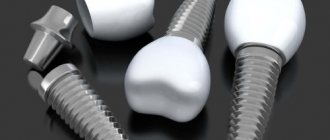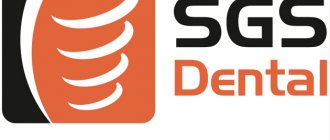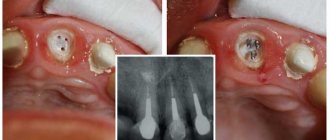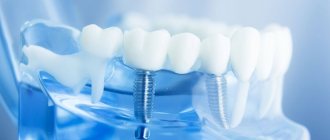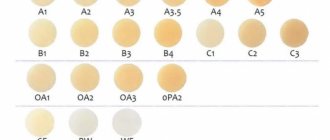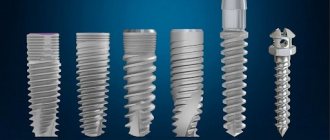Israeli or German dental implants
German implants: price and advantage
Israeli implants: pros and cons
How to choose the right implant
There are thousands of manufacturers of implantation systems in various price categories in the world - from budget to premium. Therefore, choosing a dental implant is not an easy task.
For many people, the total cost of implantation is of great importance, which depends primarily on the type of implantation system. And the type of implantation system, in turn, depends on the implantation method (classical or one-stage implantation).
Average cost implants
Dental designs in the mid-price segment are inferior to premium ones in some respects. These are high-quality implants that take root well in the gums. Their use rarely causes complications. Prosthetics using them is cheaper. The cost of mid-price implants is 25-35 thousand rubles.
This category includes:
- Oraltronics
(Germany). German titanium implants with double FBR coating. They are characterized by fast and good survival rate and high primary stability. This allows you to speed up implantation, reducing the time between prosthetic stages. They have almost no contraindications; the bone settles minimally during implantation. - SuperLine
(South Korea, USA). The Dentium brand is from South Korea, and the system is developed at facilities in the USA. Installation of SuperLine implants is characterized by minimal trauma and rapid survival. Thanks to the special design of the double threaded rod, it is suitable for use in clinically difficult cases. Forms a single system with bone tissue. The model range includes both standard implants and products for one-stage implantation. - Anyridge
(South Korea). The systems of this brand are distinguished by simple and low-traumatic installation for the patient. With their help, you can carry out prosthetics even immediately after tooth extraction. They have practically no contraindications; they can be installed in dense and loose bone tissue, with a narrow bone or lack of height. The rod takes root quickly and is highly stable. The surface of the rod is coated with calcium ions, which accelerates healing. - ROOTT
(Switzerland). Implants for one-stage installation. They are used when two or more teeth are missing in the dentition. The procedure is performed under local anesthesia in one visit to the doctor. The rehabilitation period is about 3 weeks. The main advantage of this system is the absence of contraindications. It can be installed for any condition of bone tissue, for periodontal diseases. - Bicon
(USA). Bicon systems use a screwless connection. The abutment can be positioned 360 degrees. This makes the system one of the best in its segment. The procedure is minimally invasive. The rod takes root quickly and well, forming a single system with the bone tissue. - BioHorizons
(USA). Suitable for use in difficult cases - with loose bone tissue, in conditions of limited interdental space, etc. The shape, which follows the root of the tooth, facilitates installation and allows the use of implants even immediately after removal.
Bicon Implants Review
German implants: price and advantage
The German Impro system allows for simultaneous implantation with immediate loading (this is not always possible, only according to the indications of a dental surgeon), and makes it possible to perform prosthetics even with a large inclination of the implants relative to each other. A special titanium alloy with maximum compatibility with human tissue eliminates the risk of rejection and allergies. In addition, the wide range of Impro implants makes it possible to perform implantation without bone grafting (if indicated). The main disadvantage is the relatively high cost, so these implants can hardly be classified as budget ones.
Advantages of XiVE implants
Experts in the field of implantology have assessed the characteristics of elements from Germany and increasingly prefer products from this brand.
- Pure titanium. The design is entirely made of high-strength and biocompatible material. It does not cause allergies and has a minimal risk of rejection. Titanium is non-toxic, durable and lasts for decades.
- The special coating FRIADENT plus is a development of the manufacturer. A titanium pin is treated with a special abrasive and acid and acquires a finely porous structure. This promotes survival and reduces the risk of side effects.
- Unique combined carving pattern. At the end of the XiVE implant it is deep and wide, which facilitates easy penetration into the bone. In the middle, the pace of the turns is less pronounced, which gives high stability and fastening strength. This characteristic is especially important for implantation into soft bone and bone defects.
- Unique connection type. The hexagonal connection between the post and the abutment creates a vacuum during fixation, so there are no gaps between the XiVE implant and the mount.
- High aesthetics. The crowns look natural, have a transparent edge and maintain the gum contour.
- XiVE implants are suitable for any type of prosthetics, including single-stage implantation.
- High survival rate, almost zero chance of rejection. Lifetime warranty after installation.
For almost 20 years, XiVE implants from Germany have been the standard of quality in the field of prosthetics. The world's largest clinics work with the brand's products.
Israeli implants: pros and cons
Israeli implantation systems were once quite popular due to their low cost, but now doctors prefer other manufacturers. The reason is not only that Israeli systems are not suitable for many clinical cases, thereby limiting the capabilities of the implant surgeon, but also in the quality of the implants themselves. An example is the presence of aluminum and vanadium in the alloy, which reduce biocompatibility. In addition, other manufacturers use more modern technologies, for example, they impregnate the surface of implants with a nano-layer of calcium phosphate, fluorine, etc. for accelerated engraftment, which Israeli colleagues cannot boast of.
Installation protocols
Installation requires the following steps:
- initial examination, diagnosis;
- preparatory steps, removal of damaged teeth, office cleaning of plaque and elimination of caries, gingivitis, and other diseases;
- taking impressions, selecting shades;
- manufacturing and installation in accordance with the selected technology.
One of the stages of preparation is the identification of indications and problems that may become an obstacle to restoration. To do this, the doctor prescribes diagnostics, which includes the following methods:
- X-ray to assess the condition and select a treatment regimen;
- computed tomography to analyze bone structure, study canals and sinuses;
- panoramic orthopantomogram, which allows you to obtain information about the structure of the roots, jaw arch, and the size of the spaces between individual units.
The preparatory stage is divided into two steps:
- Antiseptic treatment and anesthesia are carried out (local anesthesia is used). In the area of work, tissue is excised and a flap is separated. Then a hole is drilled (a 2.5 mm drill is used, no more), and a bed for the implant is formed. The canal in the bone is processed with final drills, the doctor selects and places a rod in the bed. A plug is then placed in place and the wound is sutured.
- The second step takes place three months later. The dentist uses infiltration anesthesia, after which he checks the position of the artificial root using a probe. The tissue above the rod is excised, the plug is removed and the former is fixed in place.
For one-stage restoration, the following procedure is followed:
- anesthesia, extraction of a damaged tooth;
- preparing the bed and screwing in the implant;
- mobilization of the mucosa, filling the resulting gaps with the help of a special osteoinductive material;
- fastening of abutment and crown.
How to choose the right implant
When choosing an implantation system, you should pay attention to:
- quality of production (imported implants have improved characteristics);
- availability of guarantees;
- availability of certificates;
- the ability to immediately install a crown on the implant (if necessary);
- the ability to do without bone grafting.
It is not necessary to understand the types of dental implants, methods of their installation, sizes, shapes and other characteristics. The main thing is to choose a clinic and a good specialist who will select the optimal treatment option.
Indications for implantation
- A single defect in the dentition with healthy adjacent crowns. In this case, it is desirable to install a prosthesis without grinding down healthy teeth. German implants are excellent for these purposes.
- Missing 2-3 teeth in a row.
- Complete prosthetics of the upper or lower jaw.
- Partially decayed teeth requiring removal.
- Discomfort when wearing removable and fixed dentures. Allergy to materials.
- Various bite defects with the impossibility or impracticality of correction by other methods.
Service life, cost and hygiene features
The manufacturer Implay provides a 15-year warranty on dental products if the installation is carried out in strict accordance with protocols. But the company will refuse a guarantee in the following cases:
- violation of installation rules, medical errors (the manufacturer requires that doctors strictly adhere to the established rules and integration procedures);
- use of the product for purposes other than its intended purpose;
- there are traces of damage, self-correction on the surface of the implant;
- product defects caused by violations of prosthetics protocols for a specific model were identified;
- the structure is damaged as a result of injury or impact;
- there are violations of the rules of care on the part of the Patient;
- there are traces of mechanical damage, oxidation, corrosion;
- natural wear and tear.
The clinic’s warranty is usually 2 years, but subject to the Patient’s compliance with oral care:
- daily brushing of teeth with soft brushes;
- use of irrigators or electric brushes, rinsing with antibacterial solutions;
- using dental floss to remove plaque;
- the use of special brushes for dentures;
- refusal of whitening pastes;
- Regular visits to the doctor for prevention, sanitation and timely treatment of identified diseases.
The cost of treatment using these systems is 23,000 rubles per unit. But it can be increased due to additional measures and the need for treatment. Overall prices.
About the manufacturer
Implay is the development of an Israeli company of the same name, specializing in the production of dental prostheses. The use of high-tech equipment and non-standard solutions allowed the manufacturer to become one of the market leaders in a short period of time - today the company's products are represented in many European countries and are popular due to their functional characteristics. Each implant undergoes a testing procedure - the manufacturer guarantees replacement of products if installation problems are identified, which confirms confidence in the quality of the prostheses, which are affordable.

